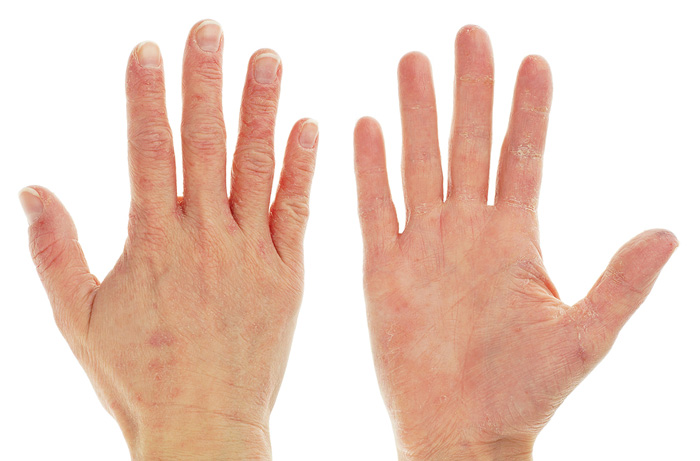What is Atopic Dermatitis?
Atopic Dermatitis, which is sometimes called Atopic Eczema or natural Eczema, is a common itchy skin disease that usually has a hereditary background.
The prevalence of this type of Eczema has increased significantly in the past three decades, especially in developed countries, and it seems that mechanization of life and urban living increase its prevalence, so that in Northern Europe, the prevalence of Atopic Eczema in children has been reported as high as 20%.
Atopic Dermatitis may flare up under stressful conditions, due to seasonal changes, or sometimes for no apparent reason. The disease usually diminishes gradually, but sometimes it recurs at an older age and in some cases it remains until the end of life.
What are the symptoms of the disease?
During infancy, the first symptoms of Atopic Eczema usually start on the face and in the form of red lesions on the cheeks. Over time, other parts of the body, especially the organs, are affected. The skin of the affected area is often dry and rough, and sometimes small hydrous spots are added to the set of symptoms. In addition, the skin of people with Atopic Eczema is much more susceptible to skin infections, especially with Staphylococcus Aureus.
But what bothers children with Atopic Eczema more than anything, is the itching and extreme irritability of the skin, so that the child may be scratching himself all the time and may not be comfortable even at night when sleeping. On the other hand, this itching will lead to an increase in infection.
In addition to the skin lesions, the affected person or other family members may have other symptoms such as dry skin, sensitive skin, allergies to certain drugs or plant pollen, dust, dog and cat hair and fur, or symptoms such as runny nose, sinusitis, sneezing, or chronic itching and redness of the eyes. Each of these signs helps to find out the possibility of a hereditary background for the disease.
Although Atopic Dermatitis often occurs in children (mostly in infancy), it may appear at any age and have an unpredictable course.
How is Atopic Dermatitis treated?
Topical steroids
The main treatment for Atopic Dermatitis is topical steroids. If these drugs are used properly, they will not cause any complications, therefore, they should be used only for a short period of time and even if possible only when the disease is active (for example, when itching and redness).
These drugs are used once or twice a day and should be used with more caution in some areas such as eyelids, armpits, and genital areas.
When the disease is recovered, the use of topical steroids should be stopped and these drugs should not be used as a means of preventing the occurrence of the disease.
Non-steroidal topical treatments
In some special cases, immunomodulator drugs such as Tacrolimus and Pimecrolimus, which do not contain steroids, may be prescribed.
Other treatment methods:
Although oral antihistamines such as Hydroxyzine or Diphenhydramine and Chlorpheniramine may not have much effect on itching, they can cause a more restful sleep for the patient.
Using a chlorine bath under certain conditions can help in curing the disease by reducing the amount of bacterial infections.
In some special conditions, oral steroids or antibiotics may also be used in the treatment of the disease.
Can the disease be eradicated?
No, but it can be controlled and sometimes the disease disappears spontaneously for a long time or even permanently!
How can the disease be prevented?
Avoid contact with factors that aggravate the disease such as stimulants, strong soaps, high heat, sweating, and allergens as much as possible.
Using moisturizers continuously and especially after bathing in order to retain water in the skin is one of the important principles of prevention. Vaseline or various creams that are available for this purpose can be used.
Recommendations for parents of children with Atopic Eczema:
- Make the use of emollient ointments part of your regular skin care routine and make it a habit. Our advice is to do this yourself personally and do not entrust its use to your child!
- Make sure your child always wears cotton underwear, avoid skin contact with nylon and woolen clothes as much as possible.
- Bathing does not make Eczema worse, but using soap and hot water will. Therefore, it is better to clean the skin with mild water and non-soap substances or very mild soaps. Also, after taking a bath, avoid rubbing the skin hard with a towel and be sure to use a conditioner immediately.
- If your doctors recommend the use of antibiotics or corticosteroid ointments for a while, follow their instructions. The correct use of these drugs will not pose any risk to your child.
- Eczema treatment requires time and patience. In addition, children with various forms of severe Atopic Eczema are often mentally different from others, so they need more and appropriate attention.

 English
English  فارسی
فارسی  Arabic (العربية)
Arabic (العربية)  French
French 

